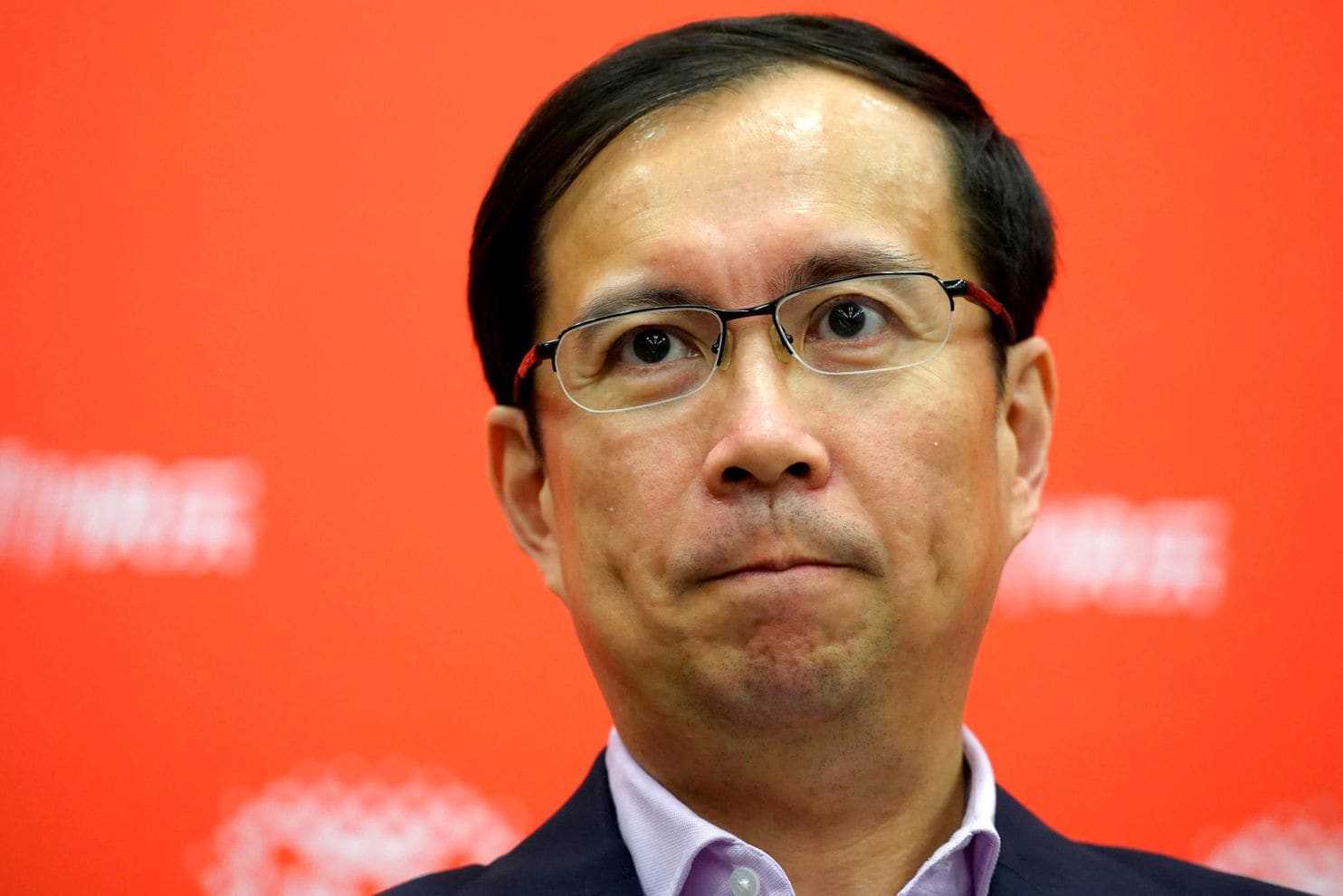Chinese billionaire Jack Ma steps down at Alibaba, announces successor

BEIJING — Chinese e-commerce giant Alibaba announced Monday that chief executive Daniel Zhang will replace Jack Ma as chairman of the board next September, outlining the celebrity billionaire’s plans to fade from the business empire he co-founded in 1999.
Ma, who is worth an estimated $36 billion, will stay at the helm of one of Asia’s biggest Internet companies for the next year to ease the transition for Zhang, who joined Alibaba 11 years ago, the firm said.
Then Ma, 54, will step down from the Alibaba Group’s board of directors after its annual shareholder meeting in 2020, shedding top-brass responsibilities unusually early for a business leader of such prominence.
“This transition demonstrates that Alibaba has stepped up to the next level of corporate governance from a company that relies on individuals, to one built on systems of organizational excellence and a culture of talent development,” Ma wrote in a letter published Monday.
The businessman will continue to work for Alibaba as a “lifetime” adviser, the company said.
Ma, a former English teacher who launched Alibaba out of his apartment with 17 of his students and friends and roughly $60,000, said he wants to shift his focus to philanthropy in education.
He described the decision as a return to his passion after running a company that has transformed the way Chinese people shop and helped usher in an almost total reliance on mobile phone payments in cities.
But Ma’s surprise departure fueled speculation that his popularity had irked a government that doesn’t like to share the spotlight.
Rockstar entrepreneurs in China tend to attract elevated scrutiny, research has found, making them more likely to be investigated or arrested than those who avoid relentless press coverage. In recent years, state-backed media has pounded Alibaba for failing to crack down on counterfeiters on its platform and highlighted reports that Ma bought a $193 million mansion in Hong Kong.
“When your star starts to rise too high, the government likes to take you down,” said Shaun Rein, managing director at the China Market Research Group in Shanghai.
Ma has hinted about the dangers that come with wealth.
“I think among the richest men in China, few have good endings,” he told a group of rural teachers at a charity event in 2016.
The country’s businesses, meanwhile, are grappling with increasing uncertainty, as economic growth is slowing, debt is rising and the United States prepares to slap tariffs on another $200 billion in Chinese imports — a threat that has already started to scramble supply chains and delay corporate investment.
[Trump talks tariffs on $267 billion in Chinese goods, in growing trade war]
“Maybe he was smart to get out while he could,” said veteran China watcher Isaac Stone Fish, visiting fellow at the German Marshall Fund, a Washington think tank.
But Lei Jianping, a Beijing technology blogger who follows Alibaba, said the succession blueprint won’t change much. When Ma left his post as chief executive in 2013, Lei said, he remained the face of the business. (Rein, the Shanghai analyst, said other business leaders have been known to feel slighted if they land a meeting with Zhang but not Ma.)
“What happens now won't change the fact that Alibaba is led by Jack Ma,” Lei said. “Jack Ma has given up only a title.”
When global leaders visit China, analysts say, they typically want to meet two people: Chinese President Xi Jinping and the beloved head of Alibaba, who has come to symbolize the rags-to-riches dream. Ma grew up poor, twice failed his university entrance exams, was rejected for a job at KFC and still became one of the richest man in China.
Ma’s influence transcends his home country.
He met with President Trump in July 2017 as Alibaba sought to acquire the Dallas-based money transfer group MoneyGram. (The deal was blocked.) He also dined with Commerce Secretary Wilbur Ross and the president’s daughter Ivanka Trump as part of a series of meetings he said were arranged to help repair relations between the nations.
Alibaba has blossomed over the last two decades into a digital powerhouse, shipping packages worldwide and shuttling supplies to the remote reaches of China. The company now has 524 million active users and reported nearly $40 billion in revenue last year.
All the while, Ma built a reputation as a corporate do-gooder. Jim Kim, president of the World Bank, has praised Ma for personally giving computers to villagers so they can take orders for their resources-strained communities.
In the United States, Alibaba’s parent company draws comparisons to Amazon.com. The firm has e-commerce, online payment, entertainment, banking and cloud computing businesses, as well as stakes in several Chinese media companies, such as Weibo, the country’s answer to Twitter. Amazon.com chief executive Jeffrey P. Bezos is the owner of The Washington Post.
In his letter Monday, Ma framed his retirement as a way to help the company keep growing, arguing he had hit the limits of his expertise.
The announcement came on China’s National Teacher Day, which happens to fall on Ma’s birthday.
“Teachers always want their students to exceed them,” Ma wrote, “so the responsible thing to do for me and the company to do is to let younger, more talented people take over in leadership roles so that they inherit our mission ‘to make it easy to do business anywhere.’ ”
Luna Lin in Beijing and Hayley Tsukayama in San Francisco contributed to this report.
Source: https://www.washingtonpost.com